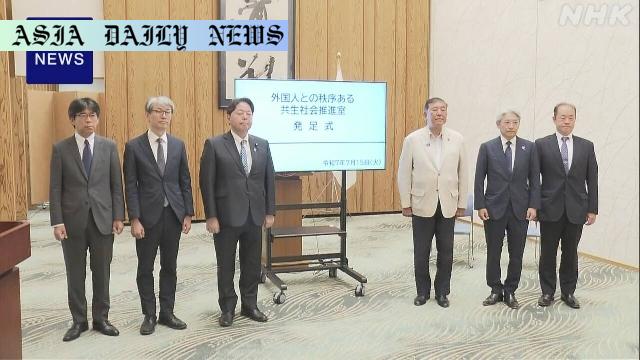Foreign residents: Japan’s government sets up a new office aimed at fostering coexistence between Japanese nationals and foreign residents.
- Japan sets up a new governmental office to address foreign resident issues.
- The office aims to build a society of coexistence and review related systems.
- Prime Minister stresses the need to balance population dynamics and manage concerns.

Introduction: Addressing Foreign Residents’ Challenges
Japan has launched a groundbreaking initiative to address the rapidly evolving challenges associated with its foreign resident population. The establishment of a new office under the Cabinet Secretariat demonstrates a firm commitment to creating a harmonious society for both Japanese nationals and foreign residents. This comes at a time when Japan is grappling with an aging population, declining birth rates, and the need for economic rejuvenation from global interactions. The new office, supported by officials from the Cabinet Office, Justice Ministry, and other bodies, is tasked with formulating and executing measures to bridge local agencies and ministries for these efforts.
Building Orderly Coexistence in a Changing Demographic
With Japan’s population aging and shrinking, Prime Minister Ishiba Shigeru emphasized the importance of adopting foreign workers and invigorating the economy through international contributions. However, he also pointed to the growing unease among Japanese citizens caused by perceived misuse of systems and instances of inappropriate behavior by foreign residents. To address these concerns, the government aims to foster ‘orderly coexistence’ by cracking down on rule violations while improving integration policies. Prime Minister Ishiba believes that strengthening collaboration and streamlining infrastructure will ensure a fairer and more inclusive society.
Role of the New Office in Economic and Social Balance
The new office not only seeks to improve societal balance but also analyzes the economic contributions of foreign residents. Foreign workers have increasingly become pillars of Japan’s workforce, particularly in industries facing labor shortages. By integrating these workers effectively into society, Japan can tap into the vitality brought by diverse international influences. Thus, this office is tasked with reviewing existing governmental systems, addressing evident gaps, and ensuring the entire structure adapts to the current demographic realities.
Enhancing Collaboration Among Key Stakeholders
An innovative approach introduced by this initiative is the proposed creation of an information infrastructure that fosters closer interaction between ministries, agencies, and municipalities. This system is expected to improve communication channels, allowing better governance, quicker resolutions, and transparent changes in policies regarding foreign nationals. The ability to unify and centralize information shared between various government layers could resolve inconsistencies in policies and practices hampering past efforts to integrate foreign residents seamlessly.
Focus on Rule Enforcement and Community Security
Another priority for Japan’s government is addressing security and safety concerns. Crimes and other nuisances linked to foreign nationals, although not reflective of the larger community, pose challenges to public perception. The new office prioritizes enforcing stricter laws where necessary, ensuring those who fail to abide by societal rules are appropriately penalized. At the same time, the government pledges to uphold fairness by addressing systemic shortcomings that might inadequately accommodate foreign residents’ specific needs.
The Vision for a Harmonious Society
The core goal of this initiative is to forge a future where cultural diversity becomes Japan’s strength. By identifying and addressing areas of concern related to integration, policies, and public expectations, the government aims to embrace change constructively. With socio-economic challenges looming large, embracing foreign residents effectively could become a cornerstone of Japan’s strategy to remain globally relevant while retaining its rich cultural fabric.
Conclusion: A Step Toward Progressive Reforms
The establishment of this new office is a significant step toward making Japan a more inclusive destination for foreign residents. It underscores a proactive approach to dealing with the challenges posed by globalization in an increasingly interconnected world. Through collaboration, strict enforcement of rules, and system reforms, the government has set a model for other nations encountering similar shifts in demographic dynamics.



Commentary
Introduction: A Timely Response to Emerging Needs
The establishment of a government office in Japan to address issues concerning foreign residents is both timely and necessary. With an aging population and declining birth rates threatening to destabilize its economic growth and societal structures, Japan finds itself at a critical juncture. The decision to have a dedicated body managing these aspects showcases a forward-thinking approach that prioritizes integration without compromising societal order.
The Challenge of Striking Balance in Policy-Making
One of the most challenging aspects of the new initiative will be balancing the practical benefits of accepting foreign workers with the concerns voiced by Japanese citizens. Prime Minister Ishiba’s acknowledgment of anxieties related to perceived crimes or system misuse reflects a government attuned to public sentiment. However, it is equally important to dispel stereotypes and ensure that these isolated incidents don’t overshadow the larger benefits foreign residents bring to Japan. Building systems that ensure accountability, fair enforcement, and cultural education can help alleviate fears on all sides.
Strengthening Collaboration Across Government Bodies
The cutting-edge infrastructure proposed by the new office to foster collaboration among ministries and municipalities is a striking feature of this plan. By making policy implementation cohesive and transparent, the government can address the fragmented handling of foreign resident issues observed in the past. This will also ensure that local governments are well-equipped with the resources and guidelines needed to manage foreign residents effectively and equitably.
Addressing Integration Holistically
Ultimately, creating systems for meaningful interventions and integration is the hallmark of this initiative. Beyond responding to crimes or system misuse, Japan must invest in educational programs, language training, and community-building efforts that will result in mutual understanding and cooperation between citizens and foreign residents. Such forward-looking measures can ensure that Japan emerges as a global leader in embracing cultural diversity while maintaining societal harmony.